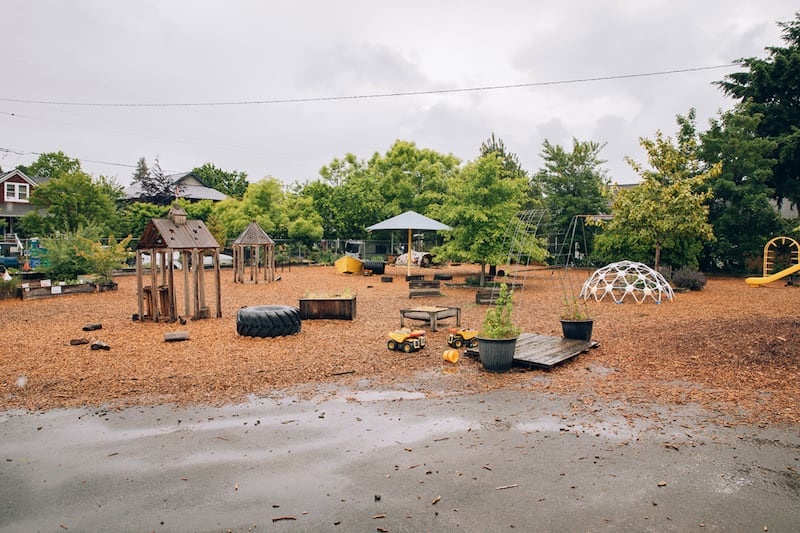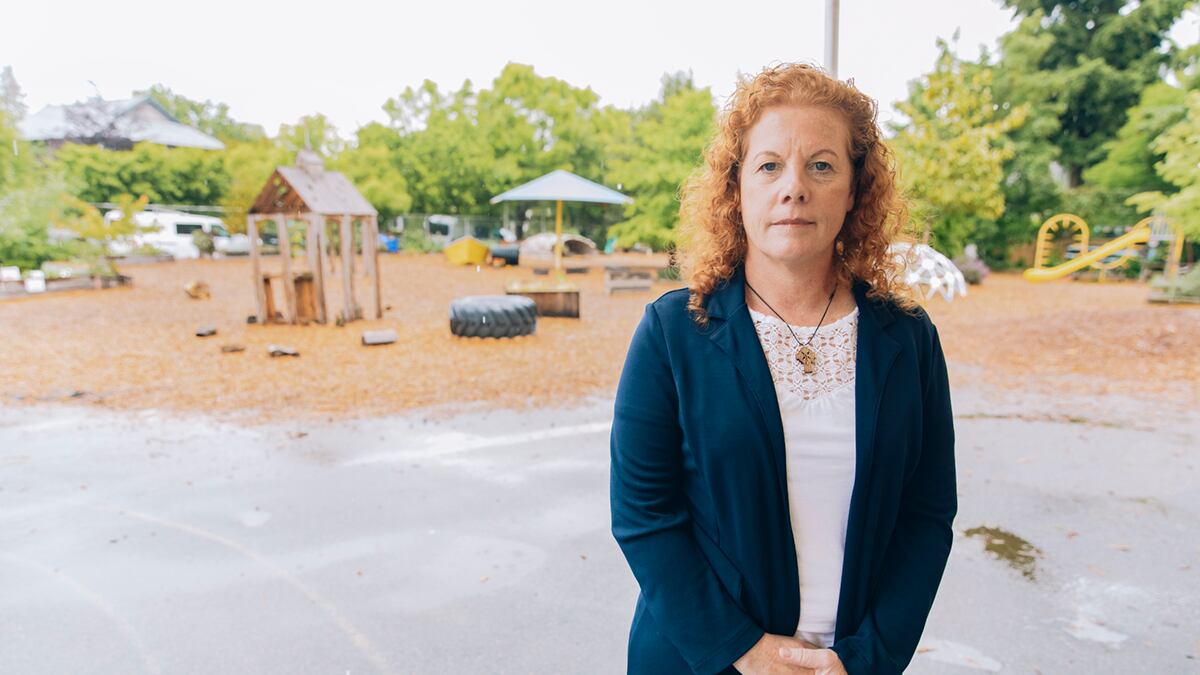In two months, Portland’s largest preschool will be kicked out of the Sunnyside neighborhood church it has called home for the past 15 years. That puts 250 kids and their families at risk of not having child care come next school year.
For the past 10 months, Crystal Gwyn, executive director of Childswork Learning Center, has been looking for a new building that’s big enough, that has outdoor space for a playground and, above all else, that Gwyn can afford to rent.
No luck.
“Very little is available that’s large enough. If it is large enough, it doesn’t meet bathroom or outdoor needs, or it’s zoned industrial,” Gwyn says. “We’ve found maybe a dozen places that could work, but the cost has been $25 per square foot, more than double what we’re currently paying. And for a third of the space.”
The impending displacement of Childswork Learning Center by St. Stephen Catholic Church is the result of a dispute that started with a neighbor complaining about parking. And while a church kicking a preschool out of its commercial space has raised some eyebrows, it’s Childswork’s nearly yearlong struggle to find a new home that is emblematic of a much bigger issue than Portland’s perennial parking feuds: If providers can’t stay afloat, how will Multnomah County implement its vision of universal preschool?
After all, Childswork isn’t the only preschool at risk of shuttering this summer. On July 1, the Opal Learning Center, housed in the Portland Children’s Museum, is closing down for good.
In fact, data presented in county budget documents shows the number of licensed preschool providers in Multnomah County dropped by more than one third in just over a year, from 1,242 in January 2020 to about 800 last month.
Early childhood education has always been an industry with heavy turnover, due to its narrow profit margin. But the closures arrive at a particularly inopportune moment.
Economists tracking Oregon’s stagnant job market say the biggest roadblock to many people, especially women, returning to the workforce is finding child care. That’s a priority for local officials, too. Last year, Multnomah County voters approved a tax on high-income households that would pay for universal preschool.
But the success of the measure hinges on finding enough existing providers to care for nearly 20,000 kids over the next 10 years.
Megan Irwin, who helped lead the county’s Preschool for All Task Force, is blunt: “We don’t have enough providers in the county to meet the needs of the universal preschool program.”
And if providers can’t sustain themselves, the county may find itself in a bind. How do you pull preschools into partnering with the county when those partners don’t exist?
“We’re the largest preschool in the city. If we can’t survive, who can? Losing our space, it’s a signal of things to come,” says Mary Beth Kierstead, director of education at Childswork. “I think it’s a signal that early childhood educators and providers can’t survive in this city.”

In 2019, a neighbor of St. Stephen Catholic Church complained to the city of Portland that the playground at Childswork took up too much parking space.
The city told the church it would need to convert a portion of its playground back to parking spaces or apply for a land use change to allow the play structure to remain, according to the city’s Bureau of Development Services.
“That’s where things seemed to have gone south,” Gwyn says of the relationship between the church and the school.
One year ago, Father Eric Andersen gave Childswork a year’s notice to leave. City officials say that allows him to get rid of the playground and restripe the parking spaces.
Gretchen Barnes, the attorney representing the parish, told WW in an email, “The parish has other plans for the space more directly connected to its core ministry.”
Barnes declined to say whether the termination had anything to do with the parking complaint.
Kierstead says she and Gwyn have scoured Portland’s eastside for appropriately zoned locations.
“There’s no space,” Kierstead says. “None of these new buildings are appropriate for children. And the cost is outrageous. We simply can’t afford $25 per square foot.”
The closing of providers forces more parents, mostly mothers, to opt out of Oregon’s workforce. About 1 in 5 Oregon mothers report staying home because of child care, according to state economist Josh Lehner.
“It’s a combo of affordability and lack of availability of child care,” Lehner says. “Would they prefer to be working if they found child care? Parents can’t work, even if they want to, if they can’t arrange it.”
Last year, advocates of early childhood education and Multnomah County officials sought to fix that problem. In November, 64% of voters passed Measure 26-214, which taxes incomes above $200,000 to expand preschool offerings to all children in the county. By raising $105 million a year, the program intends to subsidize the cost of tuition for 7,000 children by 2026.
But the model depends on reimbursing existing preschools—which requires a wide base of providers.
Multnomah County Commissioner Jessica Vega Pederson, who crafted and championed the measure, says the disappearance of potential partners is “of course a concern.”
“Space, and finding space that’s appropriate, is definitely an issue,” Vega Pederson says. “We don’t have enough child care providers and enough pre-K providers, because every county is a child care desert.”
Irwin of the preschool task force says early figures showed that the county would need to add anywhere from 270 to nearly 600 new preschool classrooms to meet the county’s 10-year implementation goal, adding that “providers have been operating for this past year in a really unstable market.”
One glimmer of hope: People working from home might free up commercial space for child care that parents need to return to their jobs.
Jerry Johnson, an economist who specializes in commercial real estate projections, says more commercial buildings may be vacated in the near future if remote work turns into a long-term custom. If there’s a massive surge in vacancies, rent prices could plummet—giving preschool providers and the county an opening.
But that’s no solace for Childswork, which has just over two months left to find a new space.
Gwyn’s last-ditch idea? Rent space at three smaller churches, and split the kids among those locations. But even that idea is a long shot, Childswork’s operators say.
“Preschools have always been vulnerable to the whims of landlords. When the county is ready to fully implement preschool for all, many of these will be gone,” Kierstead warns. “[The measure] feels like a clear signal that this is a value that Portlanders hold dear. But how are we going to implement that when centers like ours are closing?”
